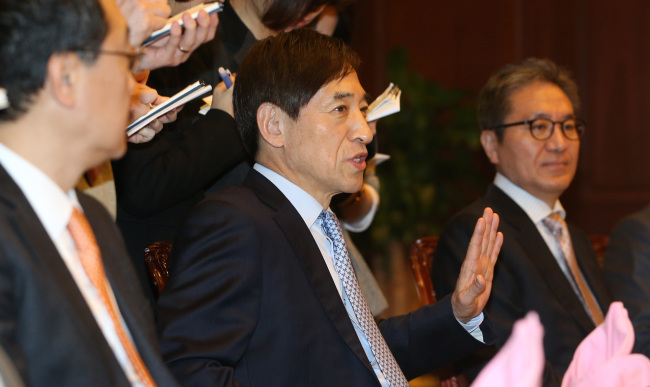Bank of Korea Gov. Lee Ju-yeol said Tuesday that South Korea’s economic conditions were improving, but the country is still facing uncertainties stemming from increasing oil prices and the U.S. Federal Reserve’s expected rate rise in the near future.
In a meeting with economic researchers and professors in Seoul, the top monetary policymaker said such external factors would increase volatility, and Korea would face short-term uncertainties.
“Volatility could increase on (rising) oil prices and the direction of the U.S. Fed’s interest rate policy,” Lee said.
“This is why Korea faces uncertainties in the short term.”
 |
Bank of Korea Gov. Lee Ju-yeol (center) attended a meeting with economic experts at the bank’s headquarters in central Seoul, Tuesday. (Yonhap) |
The U.S. central bank recently removed the word “patience” from its rate policy guidance, indicating that the world’s largest economy will be ready to increase its key rate as its employment and economy improve.
The Fed had consistently said it would wait and be patient until the employment and inflation rates reach its desirable range.
The U.S. remains one of the few economies that have recovered this year. However, analysts said the Fed could push back a rate rise as it faces low inflation and a stronger dollar. Market observers had forecast that it could begin raising its key rate in June.
The U.S. has been seeing the value of the dollar rise on the back of a rosy economic outlook, while Europe expanded its money supply through quantitative easing in the face of deflation and low growth.
Analysts said a stronger dollar, despite U.S. concerns, would benefit the global economy.
“Despite the anxiety in the United States and in financial markets about a surging U.S. dollar, the damage to the U.S. economy is limited and a strengthening greenback is a lifeline to the rest of the world,” said IHS Global Insight in a report.
“In effect, the United States is importing deflation and exporting inflation.”
BOK Gov. Lee said that Korea’s economic uncertainties had made it harder for the central bank to communicate effectively with the market, while referring to the latest rate cut to a record low of 1.75 percent.
“We will be able to send coherent signals while carefully observing economic data.”
By Park Hyong-ki (
hkp@heraldcorp.com)





![[Exclusive] Hyundai Mobis eyes closer ties with BYD](http://res.heraldm.com/phpwas/restmb_idxmake.php?idx=644&simg=/content/image/2024/11/25/20241125050044_0.jpg)
![[Herald Review] 'Gangnam B-Side' combines social realism with masterful suspense, performance](http://res.heraldm.com/phpwas/restmb_idxmake.php?idx=644&simg=/content/image/2024/11/25/20241125050072_0.jpg)

